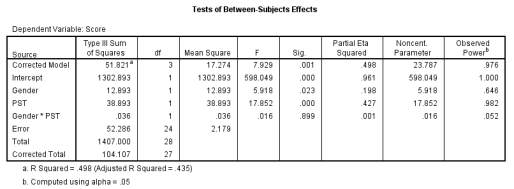Deck 14: Glm 3: Factorial Designs
Question
Question
Question
Question
Question
Question
Question
Question
Question
Question
Question
Question
Question
Question
Question
Question
Question
Question
Question
Question
Question

Unlock Deck
Sign up to unlock the cards in this deck!
Unlock Deck
Unlock Deck
1/21
Play
Full screen (f)
Deck 14: Glm 3: Factorial Designs
1
Which of the following is not a factorial ANOVA design?
A) Summated-groups design
B) Independent-groups design
C) Repeated-measures design
D) Mixed model design
A) Summated-groups design
B) Independent-groups design
C) Repeated-measures design
D) Mixed model design
A
2
Which of the following equations is correct for calculating a variable's mean squared value?
A) SSA / dfA = MSA
B) SSA × dfA = MSA
C) SSA + dfA = MSA
D) SSA - dfA = MSA
A) SSA / dfA = MSA
B) SSA × dfA = MSA
C) SSA + dfA = MSA
D) SSA - dfA = MSA
A
3
Calculate the mean and standard deviation for each group from the data below. 
 ANSWERS
ANSWERS
 If the equation for the above study was: score = (b0 + b1PSTi + b2genderi + b3interactioni)+Ei, how would you express the interaction effect between the PST and the gender?
If the equation for the above study was: score = (b0 + b1PSTi + b2genderi + b3interactioni)+Ei, how would you express the interaction effect between the PST and the gender?
A) PST × gender
B) PST + gender
C) PST / gender
D) PST - gender

 ANSWERS
ANSWERS If the equation for the above study was: score = (b0 + b1PSTi + b2genderi + b3interactioni)+Ei, how would you express the interaction effect between the PST and the gender?
If the equation for the above study was: score = (b0 + b1PSTi + b2genderi + b3interactioni)+Ei, how would you express the interaction effect between the PST and the gender?A) PST × gender
B) PST + gender
C) PST / gender
D) PST - gender
A
4
How is SSR represented in a 'between-subject effects' table?
A) Error
B) Corrected model
C) Corrected total
D) Intercept
A) Error
B) Corrected model
C) Corrected total
D) Intercept

Unlock Deck
Unlock for access to all 21 flashcards in this deck.
Unlock Deck
k this deck
5
How many independent variables are being analysed in this example?
A) 2
B) 3
C) 4
D) 5
A) 2
B) 3
C) 4
D) 5

Unlock Deck
Unlock for access to all 21 flashcards in this deck.
Unlock Deck
k this deck
6
How many independent variables are being measured?
A) 2
B) 3
C) 4
D) 5
A) 2
B) 3
C) 4
D) 5

Unlock Deck
Unlock for access to all 21 flashcards in this deck.
Unlock Deck
k this deck
7
How many within-group effects are present?
A) 0
B) 1
C) 2
D) 3
A) 0
B) 1
C) 2
D) 3

Unlock Deck
Unlock for access to all 21 flashcards in this deck.
Unlock Deck
k this deck
8
What does residual sum of squares (SSR) represent?
A) Individual differences in performance or the variance that can't be explained by factors that were systematically manipulated
B) Group differences in performance or the variance that can be explained by factors that were systematically manipulated
C) Interactive differences in performance or the variance that can't be explained by factors that were systematically manipulated
D) Cumulative differences in performance or the variance that can be explained by factors that were systematically manipulated
A) Individual differences in performance or the variance that can't be explained by factors that were systematically manipulated
B) Group differences in performance or the variance that can be explained by factors that were systematically manipulated
C) Interactive differences in performance or the variance that can't be explained by factors that were systematically manipulated
D) Cumulative differences in performance or the variance that can be explained by factors that were systematically manipulated

Unlock Deck
Unlock for access to all 21 flashcards in this deck.
Unlock Deck
k this deck
9
Suppose the research design was developed further by examining the effects of different types of goal setting (outcome, process and performance) on tennis serve accuracy in male and female novice and expert tennis players. Thirty expert tennis players were allocated to one of the three goal-setting groups, as were the novice players. How would you describe this ANOVA?
A) Two-way ANOVA
B) Three-way ANOVA
C) Five-way ANOVA
D) Three-way mixed model ANOVA
A) Two-way ANOVA
B) Three-way ANOVA
C) Five-way ANOVA
D) Three-way mixed model ANOVA

Unlock Deck
Unlock for access to all 21 flashcards in this deck.
Unlock Deck
k this deck
10
How would you define a factorial analysis of variance?
A) An experiment with two or more independent variables
B) An experiment with two or more dependent variables
C) An experiment with two or more independent and dependent variables
D) An experiment with one independent and dependent variable
A) An experiment with two or more independent variables
B) An experiment with two or more dependent variables
C) An experiment with two or more independent and dependent variables
D) An experiment with one independent and dependent variable

Unlock Deck
Unlock for access to all 21 flashcards in this deck.
Unlock Deck
k this deck
11
The variance explained by the experimental manipulation can be attributed to which of the following variables?
A) Gender
B) PST
C) Interaction between the two
D) None of the above
A) Gender
B) PST
C) Interaction between the two
D) None of the above

Unlock Deck
Unlock for access to all 21 flashcards in this deck.
Unlock Deck
k this deck
12
How many levels are present for each variable?
A) 2
B) 3
C) 4
D) 5
A) 2
B) 3
C) 4
D) 5

Unlock Deck
Unlock for access to all 21 flashcards in this deck.
Unlock Deck
k this deck
13
Suppose you were researching the effects of psychological skills training (PST), such as goal setting and imagery, on golf-putting performance (scored out of 10). Twenty-eight participants (14 male and 14 female) were recruited for the study. Seven male and seven female participants were randomly allocated to each of the two conditions. How would you describe this research design?
A) Two-way independent ANOVA
B) One-way repeated-measures ANOVA
C) Three-way mixed model ANOVA
D) None of the above are appropriate
A) Two-way independent ANOVA
B) One-way repeated-measures ANOVA
C) Three-way mixed model ANOVA
D) None of the above are appropriate

Unlock Deck
Unlock for access to all 21 flashcards in this deck.
Unlock Deck
k this deck
14
What else is an independent groups design referred to as?
A) Between groups
B) Within groups
C) Between-within groups
D) None of the above are appropriate
A) Between groups
B) Within groups
C) Between-within groups
D) None of the above are appropriate

Unlock Deck
Unlock for access to all 21 flashcards in this deck.
Unlock Deck
k this deck
15
Analyse the table below. Which independent variables have a significant effect on the dependent variable? 
A) Gender
B) PST
C) Interaction
D) No significant effects were found

A) Gender
B) PST
C) Interaction
D) No significant effects were found

Unlock Deck
Unlock for access to all 21 flashcards in this deck.
Unlock Deck
k this deck
16
How might you calculate the mean sum of squares (SSM)?
A) Sum of squares for gender + PST + gender × PST = SSM
B) Sum of squares for gender + PST = SSM
C) Sum of squares for error + intercept = SSM
D) Sum of squares for error + gender = SSM
A) Sum of squares for gender + PST + gender × PST = SSM
B) Sum of squares for gender + PST = SSM
C) Sum of squares for error + intercept = SSM
D) Sum of squares for error + gender = SSM

Unlock Deck
Unlock for access to all 21 flashcards in this deck.
Unlock Deck
k this deck
17
Calculate the total sum of squares (SST) if the grand variance (s2) = 3.86 and the degrees of freedom (df) = 27
A) 104.2
B) 0.14
C) 30.9
D) 23.1
A) 104.2
B) 0.14
C) 30.9
D) 23.1

Unlock Deck
Unlock for access to all 21 flashcards in this deck.
Unlock Deck
k this deck
18
What are the independent variables in this example?
A) Gender
B) Skill level
C) Goal setting strategy
D) Tennis serve
A) Gender
B) Skill level
C) Goal setting strategy
D) Tennis serve

Unlock Deck
Unlock for access to all 21 flashcards in this deck.
Unlock Deck
k this deck
19
Based on the table above, how was the F-score for gender calculated (assuming gender is coded as A)?
A) MSA / MSR
B) MSA × MSR
C) MSR / MSA
D) MSA / MSB
A) MSA / MSR
B) MSA × MSR
C) MSR / MSA
D) MSA / MSB

Unlock Deck
Unlock for access to all 21 flashcards in this deck.
Unlock Deck
k this deck
20
How might you wish to present the data graphically?
A) Box-whisker plot
B) Bar chart
C) Histogram
D) All of the above
A) Box-whisker plot
B) Bar chart
C) Histogram
D) All of the above

Unlock Deck
Unlock for access to all 21 flashcards in this deck.
Unlock Deck
k this deck
21
How many interaction effects would need to be analysed in this example?
A) 1
B) 2
C) 3
D) 4
A) 1
B) 2
C) 3
D) 4

Unlock Deck
Unlock for access to all 21 flashcards in this deck.
Unlock Deck
k this deck


